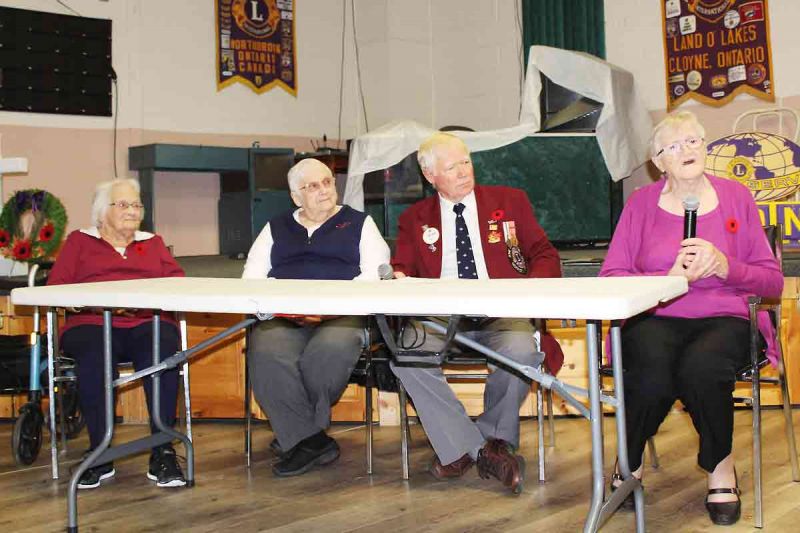Craig Bakay | Nov 18, 2019
“For 34 years, the Legion was responsible for ceremonies on Nov. 11,” Land O’Lakes Lions Past President and Zone Chair Red Emond said Sunday night in Northbrook. “This year, we’re just assisting them.”
The Northbrook observances were a little different than what one normally expects. First of all, it was held on the night of Nov. 10. Yes, there was the traditional moment of silence, laying of wreaths, playing of The Last Post and Reveille as well as a reading of In Flanders Fields, but a couple of other things set these ceremonies apart.
What made this remembrance unique were the memories of three women, two who spent the Second World War in Kaladar and Flinton, and one who was in the thick of it in Yugoslavia and Austria.
Rose Merkler has lived in Canada for 60 years, in Toronto, Skoottamatta Lake and now Northbrook.
But when she was eight years old, she was in Yugoslavia, of German descent. (Rose’s older sister, Mitzi Mangold, was scheduled to be there as well but was unable to attend).
In 1941, Rose’s family lived in Zemun, which is now a suburb of Belgrade. Her family had been in the area for 600 years, however they still spoke German. It was at that time the Germans invaded and took over the area.
While her family wasn’t a target of the Germans, many families, particularly Jewish and Romani, were.
“I remember the concentration camp (Sajmiste) and the trucks taking people over the river,” she said. “They never returned.”
In 1944, the Russians came and took over.
“The Russian were taking revenge on all Germans,” she said. “My grandfather had an oil factory and my mother’s sister had gotten engaged to an Austrian.
“My father said we had to get out.”
She remembers a neighbour who decided to stay.
“The Russians came and killed him shortly after we left.”
Once in Wels, Austria, they thought they’d be OK but things changed quickly.
“In 1944, when we got there, Austria was still under Hilter, but soon the Russians came there too,” she said.
“The Russians were like animals,” she said. “I remember one woman standing on a bridge, who cheered and put flowers on the Russian vehicles saying ‘our saviours.’
“That night, eight Russians raped her.
“I’ll never forget the screams. They (the Russians) came in, took whatever they wanted.
“There was no food.”
She said she moved to Canada when she could because “Canada is known as the peacemakers of the world.
“The horror in the world doesn’t seem to stop and it was horror. You were not safe to go anywhere but here you are safe.
“It’s great to be in Canada.”
One-hundred-and-one-year-old Meritta Parks also has memories of the War Years, albeit not as horrendous as the ones Merkler carries.
Still, they were trying times.
“In 1939, food was rationed,” Parks, who was originally from Flinton but living in Kaladar at the time. “You got so much butter, so much sugar for each child.
“If you had a big family, you got more.”
Parks shared a story of coupon booklets and rationing.
“You had a coupon booklet and I never used my butter coupons,” she said. “We had a cow and made our own butter.
“The storekeeper in Kaladar (Arnold York) asked if he could have my butter coupons.
“I bootlegged butter.”
Parks’ younger sister, Verna Andrews remembers things a bit differently.
“Before the war, nobody had money,” she said. “When I first started school, I thought we were hard up but there were kids at school who only had a single slice of bread for there lunch and maybe they had a pair of rubber boots if they were lucky.
“I had clothes because of hand-me-downs but I remember my mother made our underclothes from flour bags — and sometimes, the flour wasn’t all gone.”
She remembers when the war ended quite vividly.
“In 1945, we had a big party in Northbrook,” she said. “Everybody was dancing in on the street, and it wasn’t paved at that time.
“We had a big square dance on the gravel road.”
More Stories
- Sticker Shock - EV Charging Station To Cost North Frontenac Township
- 30th Anniversary Verona Car Show
- The Forgotten Comfort Veg - Eggplant
- MERA Stage Comes Alive This Fall
- North Frontenac Council Report - August 27
- Addington Highlands Council Report - September 2
- Here's Grief - Have You Met
- Burn Ban Off in North Frontenac, Addington Highlands - Reduced to Level One in South and Central Frontenac
- The Resurgent Sharbot Lake County Inn and Crossing Pub
- Towards Then End of Trail

